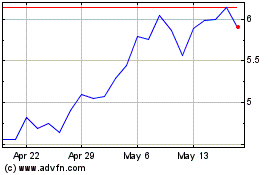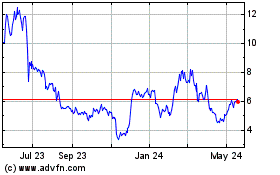Terns Pharmaceuticals, Inc. (“Terns” or the “Company”) (Nasdaq:
TERN), a clinical-stage biopharmaceutical company developing a
portfolio of small-molecule product candidates to address serious
diseases, including oncology and obesity, today announced findings
from a Phase 1 study of TERN-701 in Western healthy volunteers. The
study is an ongoing Phase 1 open-label, single ascending dose trial
to evaluate the pharmacokinetics (PK), food effect, safety and
tolerability of TERN-701 in healthy adults. TERN-701 is Terns’
proprietary, oral, potent, allosteric BCR-ABL inhibitor, a novel
class of therapy for CML that has demonstrated superior efficacy
and safety compared to traditional active-site tyrosine kinase
inhibitors (TKIs).
“We are pleased with the interim findings from this healthy
volunteer study, which indicate TERN-701 can be administered
once-daily (QD) with or without food at doses that achieve
clinically efficacious exposures. TERN-701 has the potential to be
a differentiated BCR-ABL inhibitor with advantages over asciminib,
including more convenient dosing to improve treatment options and
quality of life for people living with CML,” said Emil Kuriakose,
MD, chief medical officer at Terns Pharmaceuticals.
“We are excited to see clinical PK data continuing to support
once-daily dosing and new data showing lack of food effect with
TERN-701. The ability to dose with or without food is a key
potential differentiator from asciminib, the only currently
approved allosteric BCR-ABL inhibitor, which requires three hours
of fasting with each dose, and twice-daily dosing in multiple
clinical settings. We look forward to reporting interim dose
escalation data from the ongoing Phase 1 CARDINAL trial in the
second half of 2024,” concluded Dr. Kuriakose.
The Phase 1 single-ascending dose (SAD) trial is ongoing in the
United States and has enrolled 32 healthy volunteers in four dose
escalation cohorts of eight participants each to evaluate PK, food
effect and safety and tolerability at single doses ranging from 20
mg to 160 mg. No clinically meaningful changes or trends were
observed in clinical laboratory data, vital signs or
electrocardiogram (ECG) parameters at any dose level. Across the
dose range administered to date, TERN-701 PK was linear with a
median half-life ranging from 8 to 12 hours. At the 80 mg and 160
mg doses, TERN-701 exposures over 24 hours met or exceeded the
predicted efficacious concentrations based on preclinical data1,
consistent with observed clinical activity and safety at these
doses in the ongoing Phase 1 study in China conducted by our
partner, Hansoh Pharmaceuticals. Overall, the PK profile of
TERN-701 in Western participants was generally consistent with that
observed in the Phase 1 clinical study in Chinese CML patients.
Results of the food effect evaluation at 80 mg of TERN-701
showed no clinically significant differences in plasma exposures
(area under curve, AUC) when dosed with a high-fat meal, relative
to the fasted state. These results support potential dosing of
TERN-701 with or without food, an initial differentiation for
TERN-701 as a potentially best-in-class allosteric BCR-ABL
inhibitor.
The Phase 1 healthy volunteer study remains ongoing and will
proceed to enroll 320 mg and 400 mg dose cohorts. Terns plans to
present these healthy volunteer data at an upcoming scientific
conference.
Phase 1 CARDINAL Trial DesignThe CARDINAL trial
is a global, multicenter, open-label, two-part Phase 1 clinical
trial to evaluate the safety, PK, and efficacy of TERN-701 in
participants with previously treated CML. Part 1 is the dose
escalation portion of the trial that will evaluate once-daily
TERN-701 monotherapy in approximately 24-36 adults living with CML
to be enrolled in up to five dose cohorts. Participants will have
chronic phase CML with confirmed BCR-ABL and a history of treatment
failure or suboptimal response to at least one second generation
TKI (nilotinib, dasatinib or bosutinib). Participants who are
intolerant to prior TKI treatment (including asciminib) are also
allowed. The primary endpoints for Part 1 are the incidence of dose
limiting toxicities (DLTs) during the first treatment cycle, and
additional measures of safety and tolerability. Secondary endpoints
include TERN-701 PK and efficacy assessments, such as hematologic
and molecular responses as measured by the change from baseline in
BCR-ABL transcript levels. The starting dose is 160 mg QD with dose
escalations as high as 500 mg QD and the option to explore a lower
dose of 80 mg QD.
Part 2 is the dose expansion portion of the trial that is
planned to enroll approximately 40 patients, randomized to QD
treatment with one of two doses of TERN-701 to be selected based on
data from Part 1. The primary endpoint of the dose expansion
portion of the trial is efficacy, measured by hematologic and
molecular responses. Secondary endpoints include safety,
tolerability and PK. The overall objective of the CARDINAL trial is
to select the optimal dose(s) of TERN-701 to move forward to a
potential pivotal trial in chronic phase CML.
The CARDINAL trial plans to enroll at sites in the U.S., Europe
and other Terns global territories.
About TERN-701TERN-701 is Terns’ proprietary,
oral, potent, allosteric BCR-ABL inhibitor specifically targeting
the BCR-ABL myristoyl pocket and is in clinical development for
chronic myeloid leukemia. Allosteric inhibitors, which bind to the
myristoyl-binding pocket, represent a novel treatment class for CML
and have the potential to address the shortcomings of active-site
TKIs, including off-target activity and limited efficacy against
active site resistance mutations. TERN-701 aims to address the
limitations of active-site TKIs with the goal of achieving improved
tumor suppression through a combination of potent activity against
BCR-ABL including a broad range of mutations and improved safety
and tolerability profiles. Hansoh’s Phase 1 trial (NCT05367700)
evaluating the tolerability, efficacy, and pharmacokinetics of
once-daily TERN-701 (HS-10382) for CML in China is ongoing.
About Chronic Myeloid LeukemiaCML is a cancer
that occurs when the blood-forming cells of the bone marrow
overproduce white blood cells. In the United States, CML is an
orphan indication with approximately 9,280 new cases expected to be
diagnosed in 2024. Since the introduction of TKI therapy in
2001, CML has been transformed from a life-threatening disease to a
life-long chronic condition for most patients. Despite improvements
in outcomes with active-site targeting TKIs, many patients do not
achieve long-term disease control with these therapies due to
resistance or intolerance, leading patients to cycle through prior
generation treatments. As a result, physicians and patients are
seeking additional efficacious therapies for people whose
tolerability, co-morbidity and/or drug-drug interaction profiles
change over time, limiting their available treatment options,
quality of life and the effectiveness of mainstay therapies.
Allosteric BCR-ABL TKIs are the only class of drug to show efficacy
and tolerability benefits compared with active-site TKIs, and
represent an important advancement in the treatment of CML.
About Terns PharmaceuticalsTerns
Pharmaceuticals, Inc. is a clinical-stage biopharmaceutical company
developing a portfolio of small-molecule product candidates to
address serious diseases, including oncology and obesity. Terns’
pipeline includes three clinical stage development programs
including an allosteric BCR-ABL inhibitor, a small-molecule GLP-1
receptor agonist, a THR-β agonist, and a preclinical GIPR modulator
program. For more information, please
visit: www.ternspharma.com.
Cautionary Note Regarding Forward-Looking
StatementsThis press release contains forward-looking
statements about the Company within the meaning of the federal
securities laws, including those related to expectations, timing
and potential results of the clinical trials and other development
activities of the Company and its partners; the potential
indications to be targeted by the Company with its small-molecule
product candidates; the therapeutic potential of the Company’s
small-molecule product candidates; the potential for the mechanisms
of action of the Company’s product candidates to be therapeutic
targets for their targeted indications; the potential utility and
progress of the Company’s product candidates in their targeted
indications, including the clinical utility of the data from and
the endpoints used in the Company’s clinical trials; the Company’s
clinical development plans and activities, including the results of
any interactions with regulatory authorities on its programs; the
Company’s expectations regarding the profile of its product
candidates, including efficacy, tolerability, safety, metabolic
stability and pharmacokinetic profile and potential differentiation
as compared to other products or product candidates; the Company’s
plans for and ability to continue to execute on its current
development strategy, including potential combinations involving
multiple product candidates; the Company’s plans and expectations
around the addition of key personnel; and the Company’s
expectations with regard to its cash runway and sufficiency of its
cash resources. All statements other than statements of historical
facts contained in this press release, including statements
regarding the Company’s strategy, future financial condition,
future operations, future trial results, projected costs,
prospects, plans, objectives of management and expected market
growth, are forward-looking statements. In some cases, you can
identify forward-looking statements by terminology such as “aim,”
“anticipate,” “assume,” “believe,” “contemplate,” “continue,”
“could,” “design,” “due,” “estimate,” “expect,” “goal,” “intend,”
“may,” “objective,” “plan,” “positioned,” “potential,” “predict,”
“seek,” “should,” “target,” “will,” “would” and other similar
expressions that are predictions of or indicate future events and
future trends, or the negative of these terms or other comparable
terminology. The Company has based these forward-looking statements
largely on its current expectations, estimates, forecasts and
projections about future events and financial trends that it
believes may affect its financial condition, results of operations,
business strategy and financial needs. In light of the significant
uncertainties in these forward-looking statements, you should not
rely upon forward-looking statements as predictions of future
events. These statements are subject to risks and uncertainties
that could cause the actual results and the implementation of the
Company’s plans to vary materially, including the risks associated
with the initiation, cost, timing, progress, results and utility of
the Company’s current and future research and development
activities and preclinical studies and clinical trials. These risks
are not exhaustive. For a detailed discussion of the risk factors
that could affect the Company’s actual results, please refer to the
risk factors identified in the Company’s SEC reports, including but
not limited to its Annual Report on Form 10-K for the year ended
December 31, 2023. Except as required by law, the Company
undertakes no obligation to update publicly any forward-looking
statements for any reason.
Contacts for Terns
InvestorsJustin Nginvestors@ternspharma.com
MediaJenna UrbanBerry & Company Public
Relationsmedia@ternspharma.com
1 Effective plasma IC90 for the native BCR-ABL KCL-22 cell
line
Terns Pharmaceuticals (NASDAQ:TERN)
Historical Stock Chart
From Nov 2024 to Dec 2024

Terns Pharmaceuticals (NASDAQ:TERN)
Historical Stock Chart
From Dec 2023 to Dec 2024
